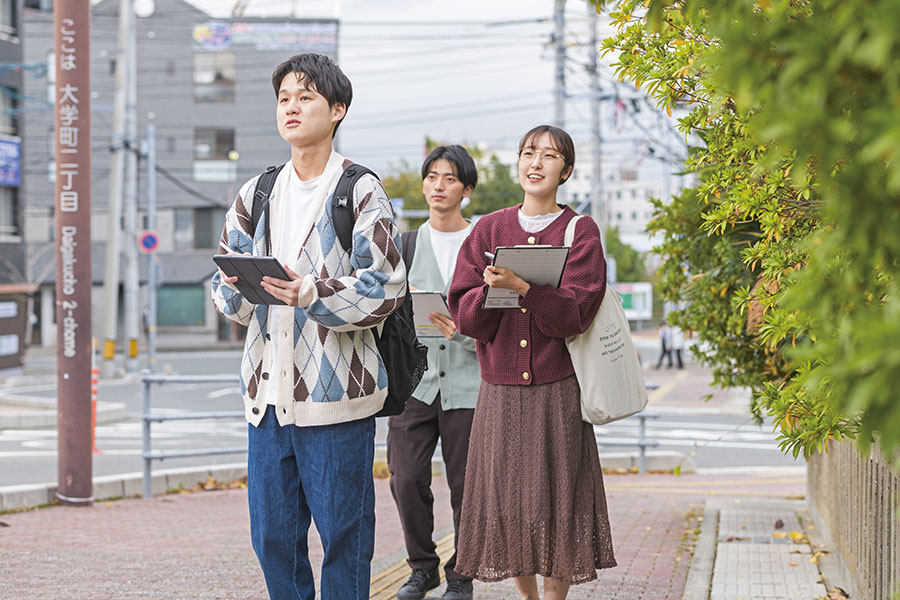- Home
- Faculty, department, and graduate school
- Faculty of Economics
- Department of Public Management
Faculty of Economics
Department of Public Management

Learning in Department of Public Management
To acquire the ability to think about public issues as well as knowledge of economics, business and commerce.
Traditional economics have considered economic entities such as consumers and businesses as "passively" in response to policy and social changes. As a result, we have considered universal laws concerning economic decision-making and the effects of various policy means, and have tried to utilize them in creating a better society.
However, people and companies, which are economic entities, are also parties that affect policy formation and social changes. Daily choices, such as what kind of policy to support and what kind of company and which goods to consume, will determine the future society. And we can turn our choice into "active" by touching new knowledge and values. For these reasons, various people and organizations that are not limited to the government are now expected to play a role as public leaders.
In Department of Public Management, in addition to economics, business and commerce studies, various fields related to the public, such as law, politics and administration. Through this, we will acquire the ability to think about social issues and solutions from a broad perspective and standpoint.
Diplomatic policy for Graduation Accreditation and Graduation Div.
- A.
- Understand the significance of diverse people and organizations involved in areas that include public value, and acquire the ability to play an active role as a member of society in a position where they are placed.
- B.
- He understands typical approaches of economics and acquires the ability to think about economy and society from a broad perspective.
- C.
- Understand the specialized knowledge and skills related to organizational management and commercial transactions, and acquire the ability to play an active role in the organization while cooperating with various professional fields.
- D.
- He has knowledge of systems, policies, and issues related to the region and society, and has the ability to discover various regional and social issues, and to consider realistic solutions.

VOICE for current students
Department of Public Management 3rd year
Yuhei Yasuda (born from Tatsusedo High School, Okayama Prefecture) (as of April 1, 2023)
Learning and fulfillment gained from experience, and student life in both arts and culture
Shimonoseki City University has a high employment rate and specializes in economics I want to learn, so I decided to go to school.
In the Public Management Practice II, we will consider and propose projects to improve the area around Karato in Shimonoseki City. We walked around the Karato area, found issues and improvements, discussed many times for group presentations, and prepared materials. When the group presentation was over, we received high praise, and our efforts so far were fruitful and felt very fulfilling. I want to make use of what I learned in this class even in specialized exercises starting in the third year. In addition, we listen to seniors and keep studying at home for civil servants who want aspiring.
I usually work hard while studying and working part-time, I belong to Shorinji Kempo Club. Support for student activities is also substantial, such as subsidies for expeditions and incentives for achieving excellent results in the tournament. Thanks to these support, we were able to achieve the results of participating in the national competition.
Curriculum policy for organizing and implementing curriculum policy
- A.
- Understand the significance of various subjects being involved in areas that include public value, through the basic and major applications.
- B.
- Understand the major approach of economics through the basic and major application "Economic and Finance".
- C.
- Understand various specialized knowledge and skills related to organizational management and commercial transactions through the basic and major application "management and accounting".
- D.
- Deepen knowledge of systems, policies, and issues related to the region and society through major applications “laws, politics, administration” and “region and society”.
Introduction of class subjects

Non-profit organization theory
Non-profit organizations are also called NPOs. It is not a government, nor a company. Although it is a private organization, he does not make money. It is an "organization that has been established with aspirations" for friends and communities, for the country and society. Non-profit organizations reach out-of-the-art areas and boldly confront the problems caused by governments and large corporations. Their success has changed the world and has changed the times. A non-profit organization is a detailed explanation of who has been doing what has been done.

Administrative law
Let's look back at everyday life. I ride a moped motorcycle and buy medicine at a drugstore. In the middle of the building, I see a sign with letters written on it. Have you ever had such an experience? Also, are you living quietly at home without factory noise? In fact, the government is involved in these things. In everyday life, the government is integral part.
Under the administrative law, you will learn various administrative activities and the rules related to them. Learning administrative law may raise your daily resolution a little.

Public management special lecture
In this class, you will learn the process based on actual examples of how residents, companies, and governments are involved, share and solve local issues, and connect the region to development. The issues and response actions that each of the fields are objectively grasped, and the students themselves examine the field and discuss and organize their ideas while organizing their ideas. In particular, in the Public Management Special Lecture I, you will learn the structure of local administration, the local economy, and the basics of social surveys, and lead to fieldwork of Public Management Special Course II.
Specialized Education Curriculum
| 1 year | 2 years | 3 years | 4 years | ||
|---|---|---|---|---|---|
| Exclusively Offensive Base Foundation |
Introduction to Economics Economic Mathematics Japanese economy General of Commerce and Industry Introduction to Management Studies Microeconomics I Macroeconomics I Economic fundamentals I Bookkeeping Principles I Contemporary Politics Public Management Special Lecture I |
Non-profit organization theory Constitution Environmental Management Public Management Special Lecture II Public management theory Communication Psychology |
|||
| Exclusively Offensive Oh, Use |
Law ・ Politics Governance ・ The line Politics |
Civil Code I and II Administrative studies Introduction to Business Law Administrative Law I |
Consumer Law Local self-government theory Administrative Law II International Politics Corporate Law Human relations theory |
||
| Sutra Oh ・ Goods Politics |
Micro Economics II Macroeconomics II Economic Policy I and II Finances I and II Economic Statistics Social Policy Public Economics |
Social Security Theory Local finance theory Public accounting theory Medical Economics Theory Educational Economics |
|||
| Ground Geographic area ・ Company Meeting |
Economic Geographical III Regional theory Town development theory Sociology |
Regional Policy I and II City planning theory Geographicalism Urban sociology Urban Environment Theory Social research theory |
|||
| Sutra Segment ・ Meeting Total |
Bookkeeping Principles II Business Management Theory I and II Marketing Theory I and II Corporate Analysis Theory |
Management organization theory Non-profit Organization Management Theory Corporate Ethics Distribution policy Non-profit accounting theory Industrial Organizational Theory I Public non-profit strategy theory Welfare management theory |
|||
| Specialized exercise | Specialized Exercise I | Specialized Exercise II | |||
※The curriculum is subject to change.

Graduation PICK UP
Graduated from Department of Public Management 2022
Ayano Ogura (born from Oita Prefectural University, Minami High School)
Redevelopment of Oita Station
In order to overcome the current situation where depopulation of rural areas and overconcentration in Tokyo are regarded as problems with the recent population decline in Japan, each region is working on a livable town development plan aimed at revitalizing the region. You. Even in my hometown of Oita City, Oita Prefecture, when I realized, redevelopment had already progressed and the town was crowded, so the theme of my research was redevelopment of Oita Station. We study about policy and result that Oita-shi performed for activation of town and what kind of business, cooperation not only administrative organization but also citizen and company did not only administrative organization but also for activation of town It was clear that the cooperation of companies and citizens was necessary for this purpose.
While going to school due to the influence of COVID-19 infection, I was unable to take classes face-to-face classes. It is an impressive experience that I was able to achieve results in the form of a high evaluation of each subject in the final exam. I was able to feel my own growth in research and other university life.






